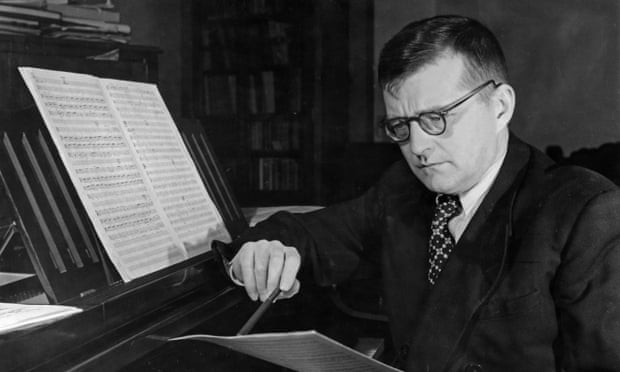‘The breadth of a whole life within the pages of a slim book’: Dmitri Shostakovich in 1950. Photograph: Sovfoto/UIG via Getty Images
Julian Barnes’s last novel, the Man Booker-winning The Sense of an Ending (2011), engaged in subtle and sustained dialogue with the book whose title it pilfered, Frank Kermode’s brilliant 1967 work of narrative theory, also called The Sense of an Ending. Barnes’s latest, The Noise of Time, borrows its title from Osip Mandelstam’s memoirs, and again the earlier work casts interesting light upon Barnes’s project. Mandlestam was one of Stalin’s most outspoken critics, his fate sealed with the words of his 1933 Stalin Epigram. He was exiled in the Great Terror and died in a Vladivostok transit camp in 1938. The subject of The Noise in Time is not the brave, doomed Mandelstam, though, but a rarer genius, one whose art continued to flourish despite the oppressive attentions of the Soviet authorities: Dmitri Shostakovich.
The Noise of Time initially appears to be the latest addition to a hybrid literary form with which we are increasingly familiar – the fictional biography. Recent examples range from Colm Tóibin’s The Master (which presented a repressed and unhappy Henry James) to Nuala O’Connor’s excellent Miss Emily (which gave us a wilful and tormented Emily Dickinson). As with all great novels, though – and make no mistake, this is a great novel, Barnes’s masterpiece – the particular and intimate details of the life under consideration beget questions of universal significance: the operation of power upon art, the limits of courage and endurance, the sometimes intolerable demands of personal integrity and conscience.
More
The Noise of Time initially appears to be the latest addition to a hybrid literary form with which we are increasingly familiar – the fictional biography. Recent examples range from Colm Tóibin’s The Master (which presented a repressed and unhappy Henry James) to Nuala O’Connor’s excellent Miss Emily (which gave us a wilful and tormented Emily Dickinson). As with all great novels, though – and make no mistake, this is a great novel, Barnes’s masterpiece – the particular and intimate details of the life under consideration beget questions of universal significance: the operation of power upon art, the limits of courage and endurance, the sometimes intolerable demands of personal integrity and conscience.
More

No comments:
Post a Comment